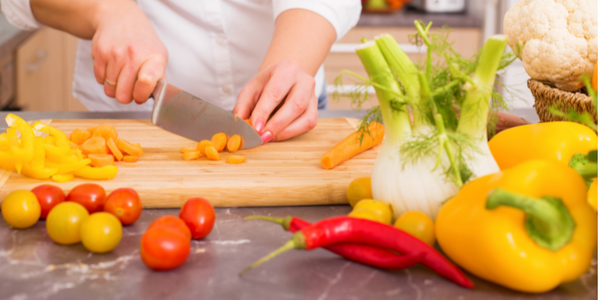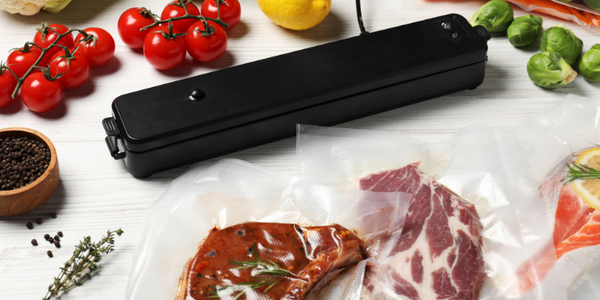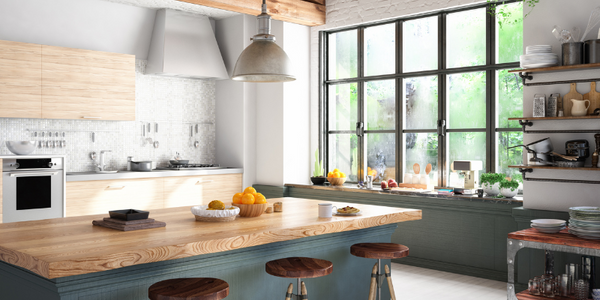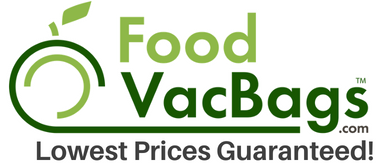Posted on July 19 2019

Have you ever wondered if there are foods you should not be vacuum sealing? There are many foods you can vacuum seal for extended freshness; unfortunately there are a handful that you should not preserve using this method. Some foods contain anaerobic bacteria, which can grow without the presence of air. Within a vacuum sealed pouch, with reduced oxygen, these bacteria will grow and may pose a risk to your health.
Do not vacuum seal:
- raw mushrooms
- garlic
- soft cheeses (blue cheese, brie, camembert, ricotta and other soft and unpasteurized cheeses)
- freshly cooked or steamed vegetables (safe to vacuum seal after they are at room temperature)
In addition, many common vegetables emit a gas when stored. If these vegetables - in the Cruciferae or Brassicaceae family - are kept in a vacuum sealed bag, this gas will cause them to spoil. To store these vegetables properly they should be blanched, dried, then vacuum sealed and frozen for storage.
Blanch first:
- arugula
- bok choy
- broccoli
- brussels sprouts
- cabbage
- cauliflower
- kale
- radishes
- turnips

Related Posts

Vacuum Sealing for Meal Prep: Organizing Your Week with Ease

Troubleshooting Common Vacuum Sealing Issues: Tips for Optimal Performance




Hello Edgar – I’m a little confused by some parts of your questions, but I will do my best to answer them.
A – IS IT GOOD TO VACCUM PACK FRESH FISH. CHICKEN, & MEATS AFTER CLEANING AND WASHING. – Yes! Our vacuum seal bags are perfect for vacuum sealing fish, chicken and meats.
B – HOW LONG CAN YOU KEEP IT IN THE FREEZER AFTER VACUUMING – Here is a link to a great chart that will help you figure out how long you can keep things after they are vacuum-sealed. – https://foodvacbags.com/pages/storage-time-for-foodvacbags-vacuum-sealed-foods
C – WHAT TYPE OF VACCUM PACK DI YOU RECCOMENT. PLASTIC OR ALUMINIUM. – I’m not sure what Aluminium packs you’re asking about. I’m thinking you might be thinking of Mylar bags. For meats and fish, we recommend plastic. Mylar is typically better for dry goods. Here is a link with more information on Mylar bags: https://foodvacbags.com/blogs/foodsaverblogs/the-benefits-of-using-mylar-bags-how-to-use-them?pos=1&_sid=dd3a77b71&ss=r
D – IS THE DOUBLE SIDE COMBINATION OF CLEAR PLASTIC /ALUMINIUM RECOMMENDED – I’m not sure what you are referring to with this question. I’d be happy to try to answer with a little more detail.
E – SHOULD I USE ONLY PLASTIC OR ONLY ALUMINIUM. – While these products are similar, they have different uses (if you’re referring to Mylar bags).
A FEW QUESTIONS:-
A) IS IT GOOD TO VACCUM PACK FRESH FISH. CHICKEN, & MEATS AFTER CLEANING AND WASHING.
B) HOW LOMG CAN YOU KEEP IT IN THE FREEZER AFTER VACCUMING.
C) WHAT TYPE OF VACCUM PACK DI YOU RECCOMENT. PLASTIC OR ALUMINIUM.
D) IS THE DOUBLE SIDE COMBINATION OF CLEAR PLASTIC /ALUMINIUM RECOMENDED.
F) SHOULD I USE ONLY PLASTIC OR ONLY ALUMINIUM.
Hi Michael –
Vegetables (or food in general) should not be sealed while it is still hot, as this can harbor bacteria growth. Give your food a chance to cool to air temperature before beginning to vacuum seal. You could cool it down quicker using the fridge.
As for Cruciferae or Brassicaceae vegetables, you could certainly fully cook them instead of just blancing them before vacuum sealing. I would watch out when you reheat them that you don’t end up over-cooking them. If that is not a concern for you go, I see no reason not to fully cook them, as long as you’re able to dry them and cool them before vacuum sealing.
Would you please add to the article explaining the science behind why freshly cooked or steamed vegetables should not be vacuum sealed and why it’s safe to do so after they reach room temperature? Can they be refrigerated first, then vacuum sealed?
Also, are there storage advantages to blanching Cruciferae or Brassicaceae family vegetables over fully-cooking/steaming them before vacuum sealing (assuming they are cooled first)?
Hi Joshua – Vacuum sealing fresh garlic and/or mushrooms can lead to the growth of a species of bacteria that can cause botulism. Botulism is a very dangerous disease that can potentially be lethal, which is why we advise against storing these products in a vacuum when they are fresh. You can store cooked mushrooms and garlic in FoodVacBags vacuum seal bags.
Hello Aleksandra –
Let’s talk about vacuum sealing nuts. The first step in storing nuts is to store them in a vacuum sealer bag. This will stop airflow and minimizes exposure to light. The air-tight seal will also keep any moisture out. The second step, especially in warmer climates, is to store them in the fridge or freezer. Adding oxygen absorbers certainly wouldn’t hurt. Nuts have a high oil content which tends to have them go bad quicker. If you follow these steps, your nuts will last longer.
If you plan on storing your jerky or jerky type meat for the long term, vacuum sealing it in vacuum bags will allow you to keep the moisture in and the air out. Include an oxygen absorber to maintain the freshness and consistency of your jerky, and to prevent oxygen from spoiling your jerky.
As for crackling, I suggest vacuum sealing it with a piece or two of paper towel in the bag with it and keep it in the fridge. This should preserve it for about a week. You could freeze it, but the moisture added in the freezing process can ruin the texture of the crackling.
Hi Julie – Mac and Cheese tends to last 3-5 days in the fridge. If you freeze it, it can last up to 18 months. Sometimes Mac and Cheese can get a little dried out in the freezer. If that happens, all you have to do is add a little milk when you reheat it.
I am going to start making meals for my 89 year old Dad and I am wondering how long Mac and cheese would last in fridge after Vacuum sealed? Could freezing work? Would like to do a variety of different things that would last him about a month.
How about mushrooms or garlic that’s refrigerated or frozen?
Hi,
I’m considering some food storage in vacuum sealed bags.
If i dehydrate whatever sliced roast and vacuum seal it, will it keep wirhout refridgeration? Just like jerky… Talking of roast – preserving crackling would be nice, too. The last batch i made was not really preserved, but was still good to consume after a week of starage in a regular plastic box.
What about monkey nuts? Normally, the date on the bags they’re sold in is like 3-4 months away, and it doesn’t seem distant enough… i’d peel them…
Things like pecans, macademias, sesame seeds or nut flours? Or would it be better to add oxygen absorbers into vacuum sealed bags for extra protection?
Hi Karl – There are certainly ways to vacuum seal your soup. As Constance mentioned, you can freeze it first. If your soup is cool, you can also keep the vacuum sealer above the bag. This works best if you have a pulse option on your machine. I do this by “hanging” the bag over the edge of my counter, then pulse and seal. Please just be careful not to get the liquid in your machine as you can damage it.
Karl -
You can put your soup in vacuum bags, fold down the top, clip and freeze standing up or leaning against something. Then, when frozen, vacuum seal.
Before placing liquids in the bags, I turn down the top of the bag 4 or 5 inches and place upright in a 2C measuring cup or something similar….ladle in the soup or other liquid, then gently fold over the top & secure with a clip of some sort and freeze. Sounds complicated, but it isn’t really! :-)
I love to make big batches of soup. Can I vac-pac soup, say chicken noodle?
Hello Aracelis – Yes, you can absolutely vacuum seal cooked meats and rice. I would suggest waiting until your cooked food is completely cooled before vacuum sealing it and freezing it. Our vacuum seal bags are microwave and boil safe. Feel free to heat up your pre-made meals either of those ways.
Can l vacuum cooked foods like meats rice and defrost them and heat it in the vacuum bags ?
Hi Kathy – So vacuum sealing powdered goods can be a bit tricky. While your machine is taking all the air out, it can also take out some of the powder with it and clog or damage your machine. That’s typically why people choose the paper bag method.
I just bought a Food Saver. I would like to dry save sugar and flour in their original 5 pound bags (along with the food saver bags of course)…but I don’t want to use the “paper bag” method I’ve seen suggested. Do you think this would work?
Hi Tilley – Coconut Macaroons do not NEED to be refrigerated, but they should be kept as cool as possible. If left at room temperature, they will soften up a little and should be good for about a week.
Dehydrated Vegetables, as long as they’re stored in a cool dark place can last at least 6 months or longer. You may want to consider throwing in an oxygen absorber or two, just to reduce the risk of any oxidation if for some reason you aren’t able to completely get all the oxygen out of you bag.
As for Homemade Beef Jerky, it can last a long time. Some references say 2 years (if unopened) or longer, some say 2 months. I’m not sure how much of an adventure you’re planning. If you keep it stored in a cool, dark place, I believe you should be fine for at least the 2 months, possibly longer.
I absolutely love your bags! I am preparing food for a backpacking trip so I will not be able to refrigerate or freeze the food. What would you say is the shelf life of coconut macaroons, dehydrated vegetables, and homemade beef jerky if vacuum sealed (and kept in a moderate climate but not frozen or refrigerated)? Thank you!
Hi Caro – You should be fine vacuum sealing and freezing your sauce as long as the onion and garlic are cooked and completely cooled before you vacuum seal it. It should be good for about 6 months in the freezer.